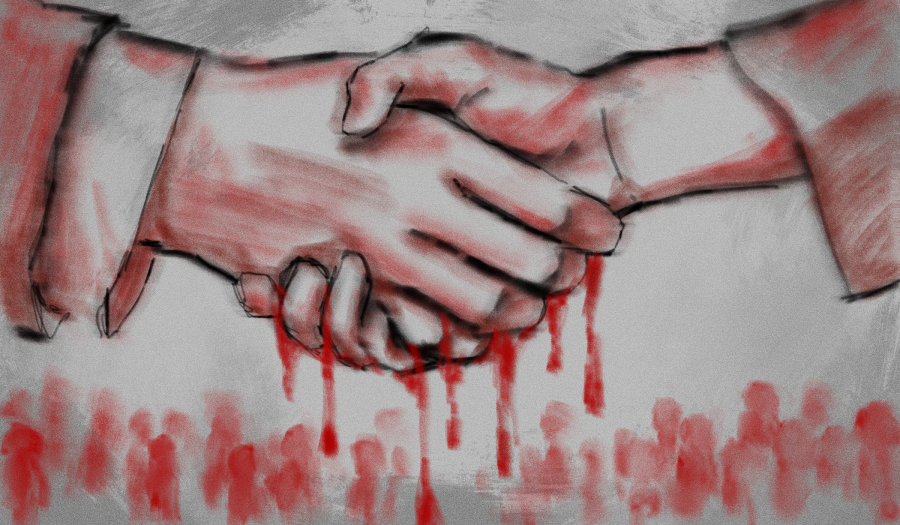How subjugation of a people never seems to be a dealbreaker between international powers hungry for economic and political gain.
An alliance between royals means nothing to the people. An exchange of crown jewels seldom enriches the masses. Starting in August 2020, the powerful leaders of Israel, United Arab Emirates, Bahrain, and the United States struck deals to fully renew economic operations. Throughout the years, many of us have been quick to applaud any normalization between Arab nations and Israel. In the struggle for guaranteed citizenship for Palestinians, the Arab world without fail addressed Palestinian concerns before inserting addendums in self-interest. This time, Arab leaders’ intentions were different. This time, not a word was exchanged on relations between Israel and Palestine. This time, riches preceded lives. The time has come for us to determine our priorities. As fellow human beings being afforded liberties that many are not, our duty is to protect the basic rights of the world’s most destitute citizens. It is our duty to examine charters that circumvent addressing humanitarian disasters. It is our responsibility to investigate proposed peace plans and subsequently take action if we sense any ulterior motives. We must avoid complacency and hold world leaders accountable when their agreements undermine the needs of the oppressed populations they claim to support.
Many have praised the treaty, officially the Abrahamic Accords Peace Agreement, between Israel and UAE. But based on international power dynamics throughout history, the deal demands inspection: did any part of this treaty work to give the powerless a voice? This entire document addresses the humanitarian crisis faced by Palestinians twice, while mentions of “trade” and “innovation” exceed a dozen. While it is improper to call a business deal by another name, it is also blatantly wrong to call it a peace agreement. While sovereigns of countries like UAE and Bahrain claim they still support Palestine, they went into the Abrahamic Accords without negotiations with Israel on the Palestinians’ demands. In fact, such deals are reminiscent of declarations made by the U.S. while the nation’s leaders were working with the British Raj. President FDR was often the first to condemn cruel British colonialism in India. Yet, it was never a dealbreaker. The deprivation of self-determination never ended the British-American alliance. Prime Minister Winston Churchill’s constant racist addressal of Indians as a nation of “barbarians” incapable of handling democracy was never quite wrong enough to end discussions between the two superpowers. The unalienable right of freedom came second to the economic and political concerns of the Allied Powers. Just as sovereignty of the Indian populace should have come first then, the sovereignty of the Palestinian populace should come first now. We hailed and continue to praise these partnerships between wealthy nations as exemplary demonstrations of justice, when in fact, true action is inevitably stalled.
Conflating business endeavors with diplomatic ones only diminishes the importance of humanitarian action. Looking back, we can begin to notice that true efforts at normalizing relations such as the Arab Peace Initiative have been placed on the back burner by money-hungry monarchs’ and leaders’ economic dealings. We can begin to realize the infinite parallels between the Abrahamic Accords and other such power grabs. Within these parallels, we can find how the suffering of the oppressed is often overshadowed by a deal boasting feigned harmony. In fact, one prime example can be seen when the British Raj officially gained control of India after the Sepoy Mutiny of 1857. On its face, the Crown was saving religious Hindus and Muslims from persecution and tyranny by the East India Company. The imperialist regime was supposedly ‘saving’ sepoys from forced consumption of the lard of animals that were deemed inedible by their respective religions. While they offered Indians this small victory, in return the Crown took the citizens’ land, livelihood, and liberty. Similarly, while the Israeli government temporarily suspended illegal settlements to solidify economically beneficial deals, they vowed to continue taking the Palestinian people’s land once Israel’s meaningless treaties were signed. A heroic diplomatic endeavor involves permanent compromise, not temporary concessions. Instead of suspending all cruel business in India and allowing her citizens to self-determine, the Crown took over, offering ‘a new day, a new light’. That is almost as preposterous as a modern country changing the name of slaves to unpaid interns if their malpractice was ever revealed. That is as preposterous as calling an economic negotiation a peace treaty.
When the British Raj had finally established itself as the powerful despot of South Asia, the great colonizer committed its own atrocities including the Amritsar Massacre and the Bengal Famine. With the ball in Israel’s court, there is no guarantee on the protection of Palestinian lives. With no concessions being made from either party regarding the Israeli-Palestinian conflict, the main reason for strained relations between Israel and Arab countries is left completely off of the table. We, as a country, claim to be the flag-bearers of democracy. But why then, are we complacent when an entire group is disenfranchised by their government? Why do we continue to mediate these deals which, in effect, bear little significance to the common man? Why do we display these empty agreements like dictators who display their empty badges of honor?
We have been led to believe that these accords symbolize the epitome of true diplomacy. In reality, they are collectively a glorified business deal. It is our job as beneficiaries of a self-governing nation to listen to the masses. While the wealthiest among us settle deals for monetary gain, “We the People” unionize for our fair share. It is our job to do the same for our oppressed counterparts around the world. With a greater understanding of the needs of the people, we can vouch for meaningful discussion. With greater knowledge, we can demand our representatives to draft conditions and priorities. With our voice, we can demand the powerful to broker peace first, business second.
Art by Angela Liang for the UC San Diego Guardian

















Allan Poshel • Jan 24, 2021 at 11:33 am
I really wanted our customers to be able to satisfy their needs on their own, but it took me a long time to figure out the serious problem with self-service on my website.But I was able to find the right solution! A well-written article on why is customer service so important in business today helped me. After reading it and analyzing everything I found the solution to most of my problems. My team and I were able to build a competent work plan, bypassing the risks. The article helped me to choose the right strategy to develop my business. I think I am not the only one who has had similar questions, so this article will be helpful to many.